| Srl | Item |
| 1 |
ID:
111575
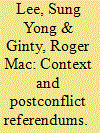

|
|
|
|
|
| Publication |
2012.
|
| Summary/Abstract |
This article argues that referendums in societies coming out of war often fit into the conflict resolution rather than the conflict transformation paradigm. As conflict resolution devices, they may be one-off events rather than part of a longer term attempt to recalibrate relationships between antagonistic groups. Using a number of case studies, the article argues that unless the ground is prepared beforehand, referendums may have a limited ability to bring about reconciliation. Some well-timed referendums have advanced peace processes at critical moments, but these are exceptions and we should be cautious in recommending them as exemplars to other cases. The article highlights three common contextual issues that limit the conflict amelioration possibility of referendums: the exclusion of key constituencies from debates on the referendum process, a lack of voter education, and generalized insecurity.
|
|
|
|
|
|
|
|
|
|
|
|
|
|
|
|
| 2 |
ID:
111579
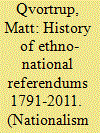

|
|
|
|
|
| Publication |
2012.
|
| Summary/Abstract |
This article presents an overview of the total number of ethno-national referendums since the French Revolution to the present day. After establishing a typology of referendums, the article goes on to present the trends in their use from the beginning of the eighteenth century to the present day. While referendums are said to be about democratic legitimacy and idealistic principles, the history suggest that short- and long-term political calculations have been the main motivations for holding them and that their overall number have grown, especially in times of geopolitical upheaval.
|
|
|
|
|
|
|
|
|
|
|
|
|
|
|
|
| 3 |
ID:
111577


|
|
|
|
|
| Publication |
2012.
|
| Summary/Abstract |
The latest round of negotiations to solve the Cyprus problem commenced in 2008 with a pledge to submit any agreement to separate simultaneous referenda. Unlike the aborted Annan Plan that was rejected in referenda in 2004, this round of negotiations was meant to be qualitatively different in being for and by "Cypriots." This article assesses the negotiations given the 2004 precedent and legacies. Does the current process entail a qualitatively different approach to design that could affect the outcome of a future referendum? Opportunities to bring citizens into the process have been missed. Moreover, due to stalemates, the international mediators have had to exert more pressure, leading to internationalization and nullifying the "Cypriot-led" process.
|
|
|
|
|
|
|
|
|
|
|
|
|
|
|
|
| 4 |
ID:
111574


|
|
|
|
|
| Publication |
2012.
|
| Summary/Abstract |
The article tackles some of the questions that arise from the invocation of "the people" in independence referendums in a contextualized way by examining the constitutional experience of two independence referendums: Quebec's unsuccessful independence referendum in 1995 and Montenegro's successful one in 2006. I argue that democratic theory does not presuppose the unified people as a decision-making unit, but rather that it conceals two, more logically primitive-and to an extent conflicted-general conceptions relevant to independence referendums. While not arbitrating between them, the concluding part argues that the tension in democratic theory ought to, at a minimum, contribute to reducing the vehemence of nationalist politics involved in attempts to achieve political independence.
|
|
|
|
|
|
|
|
|
|
|
|
|
|
|
|
| 5 |
ID:
111578
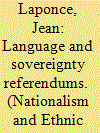

|
|
|
|
|
| Publication |
2012.
|
| Summary/Abstract |
The hypothesis that sovereignty referendums tend to bring closer together the boundaries of states and languages is tested on 80 referendums ranging from 1791 to 2011. The hypothesis is supported for union, transfer, as well as separation referendums though less clearly so in the latter case. The data show also that the boundary convergence is more significant if the zone-by-zone option, rather than the traditional majoritarian rules, is properly used.
|
|
|
|
|
|
|
|
|
|
|
|
|
|
|
|
| 6 |
ID:
111576
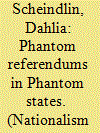

|
|
|
|
|
| Publication |
2012.
|
| Summary/Abstract |
This study examines the widespread use of referendums in entities that have declared statehood unilaterally but are not generally recognized or accepted as sovereign entities. Referendums in this situation pose a problem: to the voters, they are sufficiently a meaningful political process to warrant participation. Yet, to outsiders-including actors who may have large influence over whether the referendum's political goal can be implemented-the entire process may be meaningless. This article argues that the referendum process is not meaningless but symbolic: It fills the space between actual and desired political reality for the entities who vote. Drawing on referendum experiences in seven phantom states, the research shows that the referendums play a critical role in articulating political intentions, staking out a self-determination or sovereignty claim, displaying democratic legitimacy and forging international divisions and coalitions. Even not holding a referendum has a symbolic meaning regarding the political goals of an incomplete entity. I argue that not only can referendums signal these meanings but they can contribute to making political goals increasingly real.
|
|
|
|
|
|
|
|
|
|
|
|
|
|
|
|
| 7 |
ID:
111572
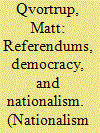

|
|
|
| 8 |
ID:
111573


|
|
|
|
|
| Publication |
2012.
|
| Summary/Abstract |
This article assesses the extent to which there is a legal requirement to hold referenda in the context of secessionist claims. If the right to secession is underpinned by the right of peoples to self-determination, ascertaining the will of the relevant people is of undoubted importance in securing political legitimacy. However, the legal requirement for a referendum is limited to cases involving agreements between relevant parties to hold a referendum and to cases where a state's constitutional law mandates a referendum as part of the secession process.
|
|
|
|
|
|
|
|
|
|
|
|
|
|
|
|